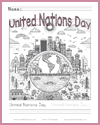Learning about United Nations Day (October 24) offers your K-12 students a vital foundation in global citizenship, diplomacy, and cooperative problem-solving. It introduces the U.N.'s history, structure, and mission to maintain peace, promote human rights, and advance sustainable development. For your students, this study cultivates awareness of global interconnectedness and challenges—such as climate change, poverty, and conflict—while highlighting how multilateral dialogue and treaties aim to address them. Lessons can explore the Sustainable Development Goals (SDGs), giving students tangible frameworks to connect classroom learning to real-world issues and inspiring civic engagement.
Studying the U.N. also encourages critical skills: debating global perspectives fosters empathy and communication, while model U.N. simulations build teamwork, public speaking, and research abilities. For your older learners, examining the U.N.'s successes and limitations prompts nuanced thinking about international relations, sovereignty, and ethical leadership. Importantly, U.N. Day discussions emphasize inclusivity, diversity, and the value of cultural exchange, helping your students appreciate their role in a multicultural world. This knowledge prepares them to be informed, empathetic, and active participants in global society.
|
















































